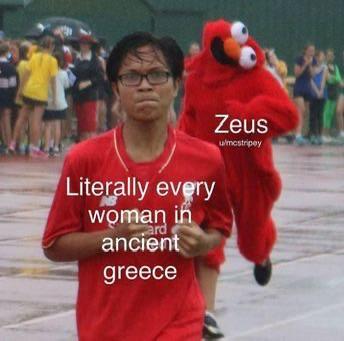History Memes - Images (22,167 results)
Sherman had it correct all along | History Memes


History Memes
Things in the universe younger than sharks | History Memes


History Memes
Iranians did not become Muslims by choice | History Memes
![Many fire temples, with their four axial arch openings, were usually turned into mosques simply by setting a mihrab (prayer niche) on the place of the arch nearest to qibla (the direction of Mecca). Zoroastrian temples converted into mosques in such a manner could be found in Bukhara, as well as in and near Istakhr and other Persian cities.[15][page needed] Urban areas where Arab governors made their quarters were most vulnerable to such religious persecution, great fire temples were turned into mosques, and the citizens were forced to conform or flee.[16] Many libraries were burnt and much cultural heritage was lost. [17] Iranians became Muslims by choice Iran. In 694 CE the caliph 'Abd al-Malek (d. 705 CE) bestowed the governorship of Iraq (which then comprised Mesopotamia and western Iran) on Hajjaj b. Yusuf (d. 714 CE). Hajjaj believed in the use of force to make conquered peoples submit to the Umayyads' authority. Although his introduction of harsh measures targeting Zoroastrians and his violent invasion of Central Asia might suggest that Hajjaj was anti-Iranian, Zoroastrians were subjected to public >It is also likely that many of the men, discrimination through dress women, and children taken captive regulations[66][67] not allowed to during the wars of conquest converted wear new or white clothes, [67] and under a certain amount of duress or at compelled by enactments to wear the least an implied threat of force; the dull yellow raiment already alluded to best example is the story of the as a distinguishing badge. [14][67][70] Persian commander Hormozān's conversion to avoid execution (Tabari, > There may, however, have been sporadic use of force, not so much to I, p. 2560). compel conversions as to weaken the hold of Zoroastrianism over the population. For example, both Muslim and non-Muslim authors alluded to the execution of Zoroastrian priests, the destruction of fire temples, and the burning of Zoroastrian texts in Kvārazm (Baladori, Fotüḥ, p. 421; Bīrünī, Ätär, p. 35) Those paying Jizya were subjected to insults and humiliation by the tax collectors.[12][13][14] Zoroastrians who were captured as slaves in wars were given their freedom if they converted to Islam.[12] The Muslims raged against them. Khalid said, "O God, if You de- liver their shoulders to us, I will obligate myself to You not to leave any one of them whom we can overcome until I make their canal run with their blood." Then God defeated them for the Muslims and gave their shoulders to them. Khalid then commanded his herald to proclaim to the men, "Capture! Capture! Do not kill any except he who continues to resist." As a result, the cavalry brought prisoners in droves, driving them along. Khalid had detailed certain men to cut off their heads in the canal. He did that to them for a day and a night. They pursued them the next day and the day after, until they reached al-Nahrayn and the like of that distance in every direc- tion from Ullays. And Khalid cut off their heads. Al-Qa'qa' and others like him said to Khalid, "Even if you were to kill all the population of the earth, their blood would still not run. Blood has not done more than glistened ever since it was forbidden to flow and the earth was forbidden to dry blood. Therefore send wa- ter over it, so that you may fulfill your oath." Khalid had blocked the water from the canal. Now Khalid brought the water back, so that it flowed with spilled blood. Owing to this, it has been called Blood Canal to this day. Others, among them Bashir b. al-Khaşaşiyyah, said, "It has reached us that the earth, when it had dried the blood of Adam's son, was then forbidden to dry [spilled] blood, and blood was forbidden to flow except enough to congeal." 'Ubaydallah-his uncle-Sayf-'Amr b. Muhammad-al-Sha'bi -an informant-Khalid: On the day of Khaybar, the Prophet of God gave the people as spoils bread, stew, roast meat, and whatever other than that they would put into their bellies without becoming sated. Al-Sari-Shu'ayb -Sayf-Talhah-al-Mughirah: On the river were mills that ran with water red [with blood] for three days, grind- ing grain for the troops, who were eighteen thousand or more. Khalid sent the news by a man called Jandal from the Banü 'Ijl. A tough guide, he brought to Abu Bakr the news of the conquest of Ullays, the amount of spoils, the number of captives, how the spoils (akhmäs) had been divided, and who had done great deeds of valor. When he came to Abu Bakr and the latter, noticing his toughness and the so- lidity of the news he had brought, said, "What's your name?" the man said, "Jandal." Abu Bakr said, "How wonderful, Jandal! 54. "Qutaiba ibn Muslim converted them [Bukharans] to Islam three times but they [repeatedly] apostatized and became infidels. The fourth time he made war, he seized the city and established Islam there after much difficulty. He instilled Islam in their hearts, and made (their religion) difficult to them in every way. They accepted Islam in appearance but in secret wor- shipped idols." Narshakhi, History of Bukhara (1954),](https://i.kym-cdn.com/photos/images/masonry/003/060/768/5f8.jpeg)
![Many fire temples, with their four axial arch openings, were usually turned into mosques simply by setting a mihrab (prayer niche) on the place of the arch nearest to qibla (the direction of Mecca). Zoroastrian temples converted into mosques in such a manner could be found in Bukhara, as well as in and near Istakhr and other Persian cities.[15][page needed] Urban areas where Arab governors made their quarters were most vulnerable to such religious persecution, great fire temples were turned into mosques, and the citizens were forced to conform or flee.[16] Many libraries were burnt and much cultural heritage was lost. [17] Iranians became Muslims by choice Iran. In 694 CE the caliph 'Abd al-Malek (d. 705 CE) bestowed the governorship of Iraq (which then comprised Mesopotamia and western Iran) on Hajjaj b. Yusuf (d. 714 CE). Hajjaj believed in the use of force to make conquered peoples submit to the Umayyads' authority. Although his introduction of harsh measures targeting Zoroastrians and his violent invasion of Central Asia might suggest that Hajjaj was anti-Iranian, Zoroastrians were subjected to public >It is also likely that many of the men, discrimination through dress women, and children taken captive regulations[66][67] not allowed to during the wars of conquest converted wear new or white clothes, [67] and under a certain amount of duress or at compelled by enactments to wear the least an implied threat of force; the dull yellow raiment already alluded to best example is the story of the as a distinguishing badge. [14][67][70] Persian commander Hormozān's conversion to avoid execution (Tabari, > There may, however, have been sporadic use of force, not so much to I, p. 2560). compel conversions as to weaken the hold of Zoroastrianism over the population. For example, both Muslim and non-Muslim authors alluded to the execution of Zoroastrian priests, the destruction of fire temples, and the burning of Zoroastrian texts in Kvārazm (Baladori, Fotüḥ, p. 421; Bīrünī, Ätär, p. 35) Those paying Jizya were subjected to insults and humiliation by the tax collectors.[12][13][14] Zoroastrians who were captured as slaves in wars were given their freedom if they converted to Islam.[12] The Muslims raged against them. Khalid said, "O God, if You de- liver their shoulders to us, I will obligate myself to You not to leave any one of them whom we can overcome until I make their canal run with their blood." Then God defeated them for the Muslims and gave their shoulders to them. Khalid then commanded his herald to proclaim to the men, "Capture! Capture! Do not kill any except he who continues to resist." As a result, the cavalry brought prisoners in droves, driving them along. Khalid had detailed certain men to cut off their heads in the canal. He did that to them for a day and a night. They pursued them the next day and the day after, until they reached al-Nahrayn and the like of that distance in every direc- tion from Ullays. And Khalid cut off their heads. Al-Qa'qa' and others like him said to Khalid, "Even if you were to kill all the population of the earth, their blood would still not run. Blood has not done more than glistened ever since it was forbidden to flow and the earth was forbidden to dry blood. Therefore send wa- ter over it, so that you may fulfill your oath." Khalid had blocked the water from the canal. Now Khalid brought the water back, so that it flowed with spilled blood. Owing to this, it has been called Blood Canal to this day. Others, among them Bashir b. al-Khaşaşiyyah, said, "It has reached us that the earth, when it had dried the blood of Adam's son, was then forbidden to dry [spilled] blood, and blood was forbidden to flow except enough to congeal." 'Ubaydallah-his uncle-Sayf-'Amr b. Muhammad-al-Sha'bi -an informant-Khalid: On the day of Khaybar, the Prophet of God gave the people as spoils bread, stew, roast meat, and whatever other than that they would put into their bellies without becoming sated. Al-Sari-Shu'ayb -Sayf-Talhah-al-Mughirah: On the river were mills that ran with water red [with blood] for three days, grind- ing grain for the troops, who were eighteen thousand or more. Khalid sent the news by a man called Jandal from the Banü 'Ijl. A tough guide, he brought to Abu Bakr the news of the conquest of Ullays, the amount of spoils, the number of captives, how the spoils (akhmäs) had been divided, and who had done great deeds of valor. When he came to Abu Bakr and the latter, noticing his toughness and the so- lidity of the news he had brought, said, "What's your name?" the man said, "Jandal." Abu Bakr said, "How wonderful, Jandal! 54. "Qutaiba ibn Muslim converted them [Bukharans] to Islam three times but they [repeatedly] apostatized and became infidels. The fourth time he made war, he seized the city and established Islam there after much difficulty. He instilled Islam in their hearts, and made (their religion) difficult to them in every way. They accepted Islam in appearance but in secret wor- shipped idols." Narshakhi, History of Bukhara (1954),](https://i.kym-cdn.com/photos/images/original/003/060/768/5f8.jpeg)
History Memes
AITA for founding a country? | History Memes


History Memes
Yaass queen | History Memes


History Memes
Accurate | History Memes


History Memes
Hi guys! | History Memes


History Memes
The Spanish Civil war was strange | History Memes


History Memes
Not to mention the contributions of Prussia, Scotland, Ireland and Hungary to aiding American Indepe...


History Memes
Don't you just hate it when your highly incompetent, xenophobic, egomaniac of a leader who contradic...


History Memes
Rejecting a medal from the organization you yourself co-founded seems crazy to me | History Memes


History Memes
shouldn't have done that | History Memes


History Memes
It's still not fixed though | History Memes


History Memes
Falling asleep to descriptions of atrocities | History Memes


History Memes
The main reason Bulgaria never tried taking Constantinople (or perhaps not) | History Memes


History Memes
They're one and the same. | History Memes


History Memes
